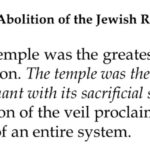Tabletalk | by Doug Ponder
“Jesus’ first miracle—turning water into wine at the wedding of Cana—is ripe with symbolic echoes of the great themes of Scripture. Why should we expect otherwise? Jesus is not the type to do anything haphazardly. Moreover, John the Apostle tells us that this miracle is the first of several signs (John 2:11), all of which “are written so that you may believe that Jesus is the Christ, the Son of God, and that by believing you may have life in his name” (20:31).
We should not, however, reduce the miracles of Jesus to mere signs of His power, as if miracles were nothing more than repeated demonstrations of Christ’s divinity. Instead, we ought to see them as signs of Jesus’ person and work, that is, signs of His divinity and signs of His divine intentions for the world.
In this way, the miracles of Jesus are not so much supernatural violations of “natural order” as they are supernatural restorations to nature ordered rightly, a picture of the way things ought to be. Thus, they point us to that day when sin and sickness and sorrow and death are no more, because Jesus will have made all things new (Rev. 21:4–5).
We can easily see this point in most of Jesus’ miracles, such as the feeding of the hungry, the healing of the lame, the exorcism of demons, and the raising of Lazarus and of Jairus’ daughter. But what hath Christ to do with Cabernet? Much in every way.
THE WINE THAT’S GONE TOO SOON
Throughout the Scriptures, wine is symbolic of God’s grace and our resultant joy (cf. Deut. 7:1–13; Jer. 31:5–12; Isa. 25:6–9; Joel 3:18). Unlike water, wine is unnecessary for life. Its superfluity is a picture of God’s superabundant grace. That is to say, our Lord is the kind of God who loves to give good things to those who don’t deserve them, superfluous gifts like “wine to gladden the heart of man” (Ps. 104:15).
Yet the great problem that attends life under the sun is the fleeting pleasure found in our idolatrous attempts to enjoy God’s gifts “apart from him” (Eccl. 2:25). This approach to life is a futile quest doomed to dissatisfaction. It is an attempt to get from God’s world what can only be found in God Himself (Rom. 1:21–25). It is a wine glass too soon empty. It is a party that runs out of joy (John 2:3).
THE NEW WINE OF THE NEW COVENANT
Enter Jesus, the Lord of the feast, the Master of the ceremony, the Vine and the Vintner. Notice how He does not follow the ways of the world, watering down the gifts of God as if to say that grace was scarce. No, our Lord makes the very best wine (John 2:10). Behold the fortified wine of grace, available to everyone who thirsts, without money or price (Isa. 55:1–2).
God has prepared a table for us, and the cup set on it overflows.
SHARE
Marvel at the generosity of Jesus’ provision, seen in the conversion of six full containers of “twenty to thirty gallons each” (John 2:6). That volume of 120 to 180 gallons is the equivalent of 605 to 908 standard-sized bottles of wine today, a perfect picture of the benevolence of God: “From his fullness we have all received, grace upon grace” (John 1:16). God has indeed prepared a table for us, and the cup set on it overflows (cf. Ps. 23:5).
Consider, too, that these were no ordinary water vessels but “six stone water jars there for the Jewish rites of purification” (John 2:6). John’s mentioning of this detail is almost certainly meant to underscore the redemptive-historical transition from the recurring ceremonial requirements of the old covenant (Ex. 30:17–21) to the once-for-all washing of baptism in the new covenant (Rom. 6:3–5; Titus 3:5–6). This is Jesus’ way of saying, “You won’t be needing that anymore, for the new wine of the new covenant is here” (cf. Mark 2:22).
And noting another possible allusion, John has gone out of his way to tell us that the wine was drawn from stone jars. In this way, Jesus’ miracle involves bringing forth wine from rock, revealing Christ to be the true and better Moses, for Moses brought forth only water from the rock (Ex. 17:6; Num. 20:8). Isn’t this pattern in keeping with what John has already told us? The water of the law was given through Moses, but the wine of grace came through Jesus Christ (John 1:17).
THE JOY THAT NEVER ENDS
Finally, notice when Jesus performs His first miraculous sign: “On the third day there was a wedding at Cana in Galilee” (John 2:1).
It is no accident that the miracle takes place at a wedding, one of God’s favorite symbols for the covenant He has made with His people. Yet are we justified in seeing anything of significance in John’s mention of the third day?
A close reading of the whole Bible suggests that it takes neither allegory nor numerology to see the significance of this detail. For the “third day” in the biblical world is frequently one of new birth and transitions from old to new. It is on the third day when Abraham sees the place where the Lord provides (Gen. 22:4–8), the third day when God meets His people at Sinai (Ex. 19), the third day when the Lord revives His fallen people (Hos. 6), and the third day when Jonah’s life is brought up from the pit (Jonah 2:3–6; Matt. 12:40). It is even on the third day of creation when the plants that make wine possible were first brought forth from the earth (Gen. 1:11–13).
In view of all this, John’s deliberate mention of the time and place of Jesus’ first miracle might point to Christ’s first miracle as an anticipation of the third day of the resurrection (Luke 24:46), the guarantee of that day when the ultimate wedding of Christ to His bride is consummated with His return (Rev. 21:1–5).
On that day, we will sing with the angels, “Blessed are those who are invited to the marriage supper of the Lamb!” (Rev. 19:9). We will drink the fruit of the vine together with Jesus (Matt. 26:29). And we will discover that this wine, like the joy of the redeemed, will never run out (Ps. 16:11).”










